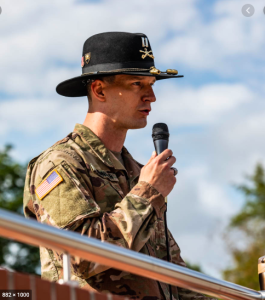- Contact Us Now: (615) 490-6020 Tap Here to Call Us
What Military Servicemembers Should Know About Non-Judicial Punishment

You may have heard about Article 15 of the Uniform Code of Military Justice (“UCMJ”). Servicemembers experienced in the realm of military justice may reference Article 15 punishment under numerous terms: punishment by the commander, non-judicial punishment (“NJP”), getting ninja punched, captain’s mast, or admiral’s mast. Essentially an Article 15 proceeding is where a commanding officer determines if a military member has committed a relatively minor infraction of the rules governing military servicemembers. In my Army service I have witnessed Article 15s for many different circumstances, including soldiers being repeatedly late to formation, a soldier being absent without leave (“AWOL”) for a short period of time, a soldier reporting drunk to duty, a soldier involved in a bar fight, a soldier that got a DUI, a soldier breaking curfew, insubordination, and a soldier falling asleep while on guard duty. More serious crimes under the UCMJ will go straight to a court-martial and not be adjudicated under Article 15. Article 15 proceedings are much more common than courts-martial.
The Uniform Code of Military Justice is the law that applies to U.S. military servicemembers.¹ This includes all branches of the uniformed services in the United States: Army, Navy, Marine Corps, Air Force, and the Coast Guard. However, the UCMJ does not apply in all circumstances. For example, National Guard and Air Guard Soldiers are only subject to the UCMJ when activated in a federal capacity. Military reserve components, servicemembers, and service academy cadets are governed by the UCMJ. ROTC cadets are exempted from the UCMJ even while on active duty for training.²
Article 15 is titled “Commanding Officer’s non-judicial punishment.”³ It authorizes commanders to impose disciplinary punishments for minor offenses without the intervention of a court-martial. Article 15 lists and limits the punishment a commander may impose on members of his command. It also authorizes the commander to suspend, remit, or mitigate the punishment imposed. Subsection (e) grants appellate rights to the next superior commander if the person punished considers his punishment unjust or disproportionate to the offense.
Part V of the Manual for Courts-Martial further delineates NJP procedure. The full text of the 2016 edition of the Manual for Courts-Martial is available online here.4 The general provisions of Part V describe the nature of NJP as being more serious than corrective measures and less serious than trial by court-martial. That provision further describes the purpose of NJP as to allow the commander “essential and prompt means of maintaining good order and discipline.”5 Commanders are responsible with, among other things, “maintaining good order and discipline in their commands.” Commanders are charged to consider NJP on an individualized basis. Commanders “should consider the nature of the offense, the record of the servicemember, the necessity for good order and discipline, and the effect of NJP on the servicemember and the servicemember’s record.”6 In most circumstances, any member of the armed forces may demand a trial by court-martial instead of NJP.
In practice, military commanders often take their responsibility to administer NJP to maintain good order and discipline quite seriously. They often discuss with other senior leaders in their organization, such as their senior enlisted advisor, whether and how to punish infractions before beginning the NJP process. Commanders also may consult with military attorneys known as judge advocates to receive advice on NJP and other legal issues. Commanders that effectively utilize NJP often seek buy-in to the process through a formalized Article 15 process. In my experience, this includes requiring the offending soldier to report with his or her chain of command for NJP consideration. Servicemembers sometimes refer to this as being called to the carpet. Commanders will then use a checklist form developed by the judge advocate’s office to ensure that all the requirements of the UCMJ for NJP are properly followed and documented in the process.
For example, as a junior officer, a soldier in my chain of command failed to follow a lawful restriction from his last Article 15 punishment and was caught in violation. As the first officer in his chain of command, I counseled him on this violation. Then I went with the offending soldier, his squad leader, and platoon sergeant to see the first sergeant and company commander. The company commander asked the soldier what happened, and we discussed. Then the commander asked for any mitigating facts. Each soldier in the chain of command was then requested to give his recommended punishment. After recommendations by the squad leader, platoon sergeant, the first sergeant, and me, the commander made his decision and imposed NJP on the soldier. The soldier and the commander then filled in and signed the appropriate portions of the form and a copy was placed in the soldier’s local military record file.
As a soldier confronted with UCMJ punishment, you have the absolute right to an attorney. The reality is that servicemembers on active duty are only provided with free legal counsel in limited circumstances. However servicemembers are always free to consult with and/or retain private attorneys at their own expense.
In practice, servicemembers confronted with Article 15 punishment are often better off agreeing to the Article 15 punishment imposed by the commander than appealing to a court-martial. If the evidence clearly establishes the servicemember committed the infraction, then it is unlikely the servicemember would be found not guilty at the court-martial. Additionally, the punishment from a court-martial conviction is often substantially more damaging to the servicemember than the punishment that would be imposed in an Article 15. An Article 15 is not seen as a conviction because it is non-judicial. Thus, an Article 15 sentence should not be damaging to future life outside the military in most circumstances. A conviction by court-martial often results in a less than honorable discharge with consequences that may follow the servicemember for the rest of his or her life, including loss of veterans’ benefits, loss of the right to vote, loss of the right to possess a firearm, etc. Therefore, servicemembers should not appeal an Article 15 hearing to a court-martial without exceptional reasons.
I have personally known several senior leaders in the Army that have been subjected to minor military punishment such as an Article 15 or Reprimand who were able to overcome that punishment and have highly successful military careers. As a military commander myself I understand the Article 15 process and am able to leverage that understanding in representing Cole Law Group’s military clients.
An experienced military law attorney can help you understand your rights, determine whether you should agree to NJP or decide to request a trial by court-martial, advise you on the applicable military rules, and brainstorm your best arguments. If you are a military servicemember facing non-judicial punishment, call today at 615-490-6020 to speak with Military Law Attorney Paul E. Tennison about your case.
_____________________
1 http://www.ucmj.us/about-the-ucmj
2 Id.
3 10 USC §815 Art. 15; available at https://www.law.cornell.edu/uscode/text/10/815
4 MCM 2016; available at https://jsc.defense.gov/Portals/99/Documents/MCM2016.pdf
5 Id.
6 Id.















